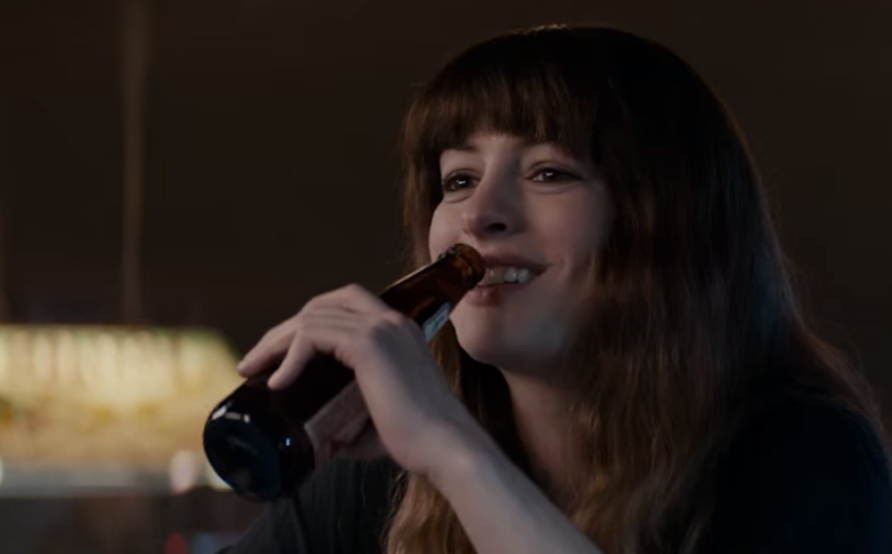There have been movies about alcoholism in the past, sure. Granted, it’s really only ever been The Lost Weekend that has addressed the matter in a non-Lifetime sort of way–which is to say, not rife with a lot of crying women or scenes of people gathered in a “share circle” at rehab. But never before has it been given the existential bent of Spanish director Nacho Vigalondo’s Colossal. Opening in Seoul twenty-five years ago, we’re introduced to a, yes, colossal monster that makes an appearance before a girl and her mother as the former picks up her doll. Cut to the present when Gloria, an overt trainwreck of a drunk in a less “charming” way than Amy, slinks into the apartment she lives in with her boyfriend, Tim (Dan Stevens a.k.a. the Beast). Tim, British and naturally uppity, meets her gaze with angered stoicism while finishing his breakfast. She seems used to his reaction by now–so used to it, in fact, that she doesn’t bother with another stale apology.
It’s too late for one anyway as Tim announces that he won’t go through the endless cycle again, that he can’t care for her in her constant drunkenness or deal with the fact that he only ever sees her in a hungover state. The tag line, “There’s a monster in all of us,” may be rather literal, but it also refers to the alcoholic’s inner personality, suppressed while sober and liable to come out primarily in the evening. And oh how it does come out for Gloria, now a year unemployed in her desired field of writing. And so, with no job, no boyfriend and no apartment to keep her any longer in New York, she returns to her hometown of Mainland (generically named and fictitious), where her parents have left an abandoned house that they’re not renting out.
She soon runs into her old childhood friend from elementary school, Oscar (Jason Sudeikis), who now manages and owns the bar his deceased father left him. Serving as a testament to her alcoholic’s memory, Gloria remarks, “That must have been so hard for your mom.” Oscar reminds her that his mother died long before his dad, and that Gloria even went to the funeral. Their bizarre friendship is initially painted as one of genuine camaraderie (though Oscar obviously has some possessive romantic feelings for her), but soon takes a macabre turn when each one learns of their monsterly powers.
That’s right, Oscar, too, manifests as a giant robot in Seoul after stumbling into the specific spot on the playground at the exact time–8:05 a.m.–required to make one’s alternate, scarier self materialize. The reasons for this inexplicable trait of theirs traces back to an incident in their childhood, one that elucidates just how long-standing and deep-seated Oscar’s jealousy of Gloria has been. He even mentions in front of his friends, Garth (Tim Blake Nelson) and Joel (Austin Stowell), that Gloria would always beat him out for every short story competition in school. As the green-eyed monster within him intensifies upon realizing his own power, he begins to wield it in a way that proves to Gloria that, as he says, she isn’t the only one who’s special. This is what drives Oscar more than anything: the desire to not be nothing.
That Gloria has started working for him in his bar only serves to accent the power he has over her, threatening that if she tries to leave he’ll destroy a neighborhood in Seoul for every day that she’s gone. In the meantime, Tim begins to feel remorse for kicking Gloria to the curb, and seeks her out in Mainland to try to help her. But an alcoholic’s dilemma can never be abetted, not truly and not completely. And through the lens of this untapped genre–science fiction comedy with a touch of kaiju–audiences are given a glimpse at just how awful a drunk can feel upon assessing herself and her behavior without being able to do much about it other than simply live with the constant compunction and self-loathing.
Further, the film is so real and so unapologetic in its presentation, that it’s almost impossible to imagine how Vigalondo got the premise approved: an inebriated person’s alter ego wreaks havoc on an entire city unbeknownst to the oblivious drunk as she mucks about in a playground. It’s nothing short of a miracle–but then, it’s a Spanish and Canadian-produced film. A Hollywood production company, on the other hand, would never want to highlight this form of neurosis and cold indulgence, which exists in a large bulk of the American population.
As the power struggle between Gloria and Oscar mounts, Vigalondo accents all of the worst qualities of humanity: pettiness, an inability to be content with what one has, an incessant need to tear others down and a predilection for self-destruction. Really, there could be no better way to get this message through than via these two quite literal monsters.
Gloria looks relieved by the end, releasing the emotions of her trauma through tears as she asks her South Korean server, “Do you want to hear an amazing story?” We think maybe this will lead to a smash cut of Gloria having gotten herself back into the writing game by turning her painful ordeal into stylized fiction gold. But no, something far more mundane and fission-causing occurs–a simple question that nightly plagues the alcoholic: “Do you want something to drink?”





















